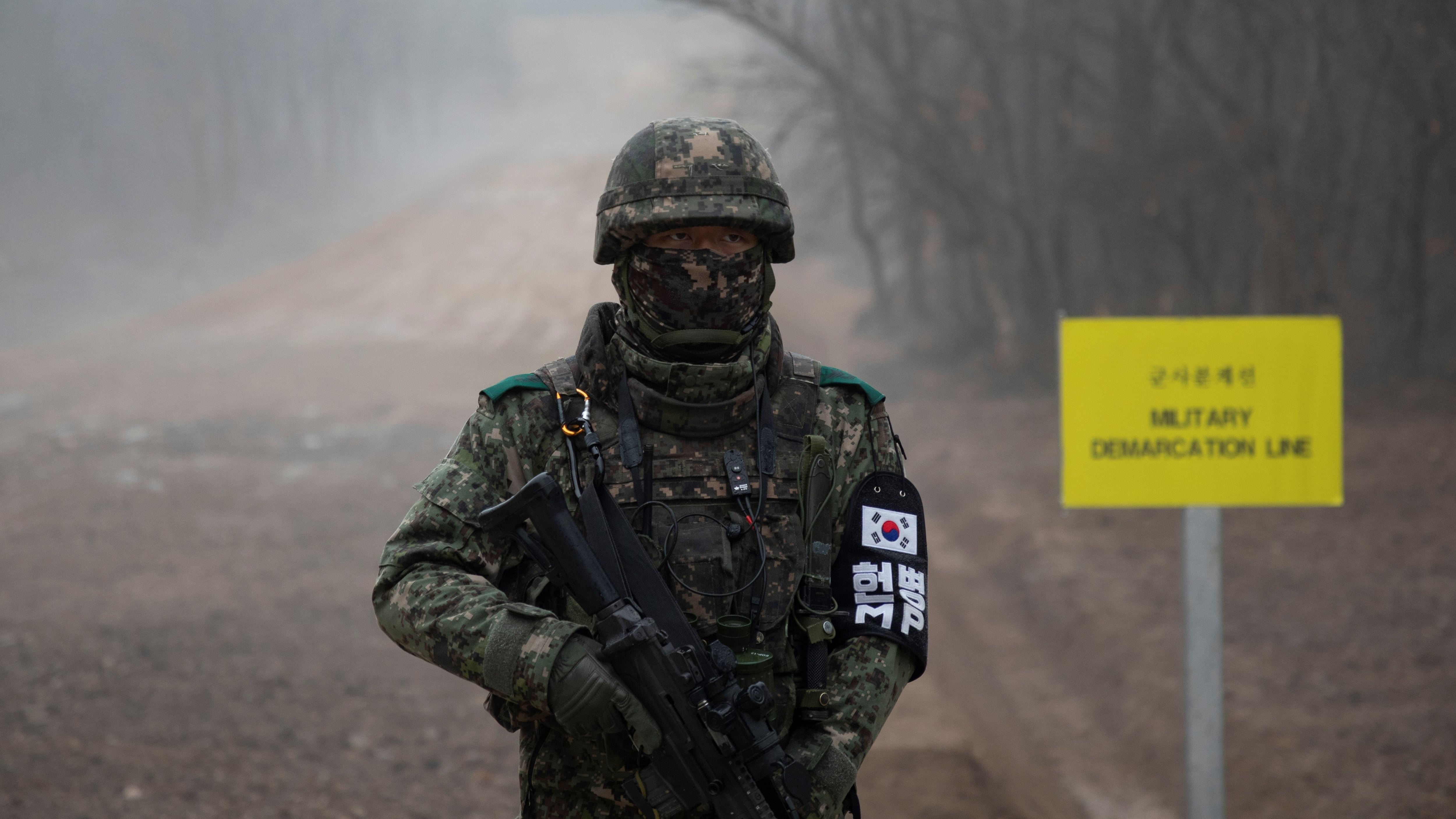BRUSSELS — Taiwan will step up efforts to become more “self-reliant” in its defense capabilities in the face of “increasing threats” from China, according to a senior Taiwanese official.
Taiwan recently accused China of "reckless and provocative" action after two Chinese air force jets crossed a maritime border separating the island from the mainland on March 31.
Chinese bombers and warships have also recently conducted drills close to Taiwan, the latest military maneuvers near the self-ruled island that the Taiwanese official denounced as “coercion” and a threat to stability in the region.
The official is based at Taiwan’s representative office to the European Union and Belgium, and spoke to Defense News on condition of anonymity.
The official said the recent incidents highlight the need for Taiwan to become more “self-sufficient” by developing a more independent defense industry. The diplomat noted the country is already building supersonic training jets to boost air capabilities, and that the government allocated more than 21 percent of its defense budget this year for the development of indigenous weapons.
RELATED

Under pressure from China, Taiwan has had difficulty since the 1980s in buying weapons and other defense equipment from anyone but the United States, and in upgrading its existing arsenal.
The official said the aim is to locally produce “advanced” defense and military equipment.
“This is necessary in order to be able to defend ourselves. This does not mean that we will stop relying on support of others in the international community, notably the U.S., for major defense equipment, but that we will more and more develop our own defense systems.”
This includes the Indigenous Defense Submarine program and new advanced training jets, he said. Proposals to build a fleet of eight diesel-electric submarines were introduced as early as 2001. In August 2016, Taiwan opened a submarine development center for production of the island’s first locally made subs.
Local shipbuilding company CSBC Corp. was contracted to produce eight submarines, the specifications of which are not yet finalized. Sources estimate a displacement between 1,200-2,400 tons, a top speed of 17 knots underwater and an operating range of 6,000 nautical miles. CSBC reportedly hopes to deliver the first submarine by 2024.
Additionally, Taiwan plans to produce 66 training jets at a cost of NT$68.6 billion (U.S. $2.2 billion), to replace the aging, locally made AT-3 trainers and American-made F-5 fighters that rookie fighter jet pilots in Taiwan’s Air Force have used for more than 30 years.
The design of the new supersonic trainer aircraft is based on F-CK-1, including the same Honeywell engine, but it will reportedly carry additional fuel. The Ministry of National Defense adopted the Aerospace Industrial Development Corp.'s XT-5 Blue Magpie design for the trainers.
Taiwan is heavily dependent on the U.S. for defense capabilities, a reliance recently reinforced when the U.S. State Department approved sale to Taiwan of a pilot training program as well as maintenance and logistics support for F-16 aircraft based on Luke Air Force Base, Arizona. The $500 million package covers program costs such as flight training, participation in approved training exercises, training munitions, supply and maintenance support, and spare and repair parts. The sale must be cleared by Congress before entering final negotiations, during which quantities, services and prices can change.
China’s recent efforts at modernizing its military is slowly but surely eroding Taiwanese local superiority, and its economic and diplomatic clout is making countries wary of selling arms to Taiwan for fear of angering China, essentially placing the self-governing island under an arms embargo.
Speaking recently at a video conference, Taiwan’s president, Tsai Ing-wen, accused China of “breaking a tacit agreement that has served the interests of peace and stability over the past two decades.”
In an attempt to counter such fears, a Chinese diplomat in Brussels pointed to a speech at the start of the year by Chinese President Xi Jinping which, the official said, “contained nothing” that suggested China sees conflict with Taiwan as imminent. However, Xi’s comments about support for peaceful “reunification” with Taiwan included a warning that “we do not promise to renounce the use of force and reserve the option to use all necessary measures” to prevent Taiwan’s independence.
For its part, the United States’ national security adviser, John Bolton, tweeted April 1: “Chinese military provocations won’t win any hearts or minds in Taiwan, but they will strengthen the resolve of people everywhere who value democracy. The Taiwan Relations Act and our commitment are clear."
Replied Tsai: “We could not agree more.”
Fraser Cameron, the director of the Brussels-based EU/Asia Centre, noted that “while there were sound reasons for Taiwan to build up its indigenous defense capacity, it would have to be careful in maneuvering between its main protector (U.S.) and claimant (China).”
The U.S. is bound by the 1979 Taiwan Relations Act to “make available to Taiwan such defense articles and defense services in such quantity as may be necessary to enable Taiwan to maintain a sufficient self-defense capability.”
“Any attempt to influence Taiwan through threats or coercion, we believe, destabilizes the region and threatens stability in the Taiwan Strait," the senior Taiwanese official said. "It hurts stability. It damages the cross-strait relationship. It damages any attempt by China to win the hearts and minds of Taiwan people. We urge Beijing to choose the path of peace, respect and civility by resuming dialogue with Taiwan’s democratically elected administration.”
Mike Yeo contributed to this report.
Martin Banks covered the European Union, NATO and affairs in Belgium for Defense News.








